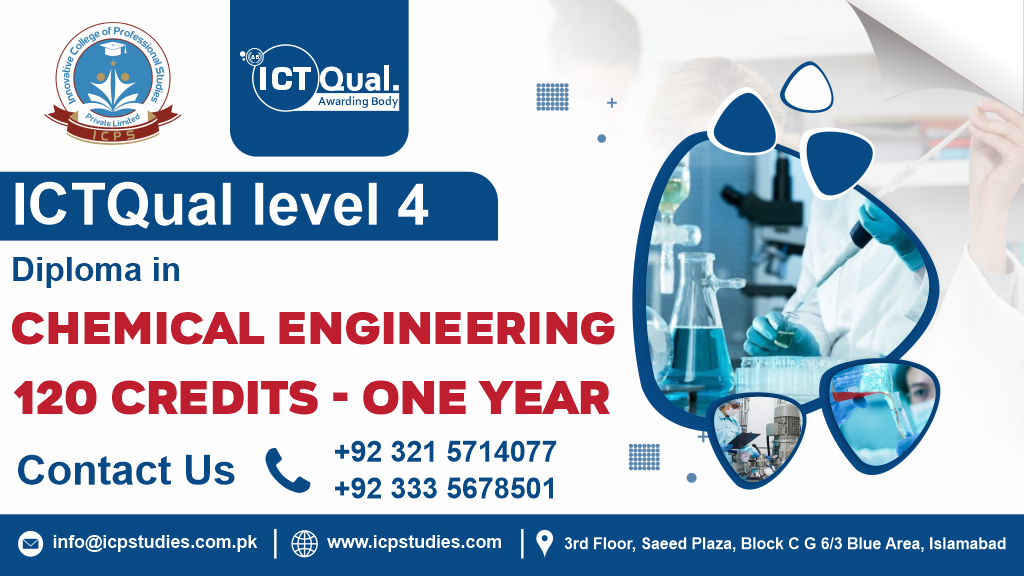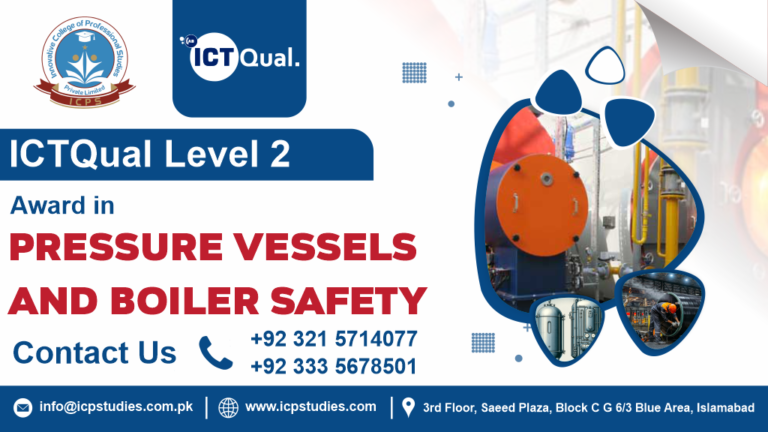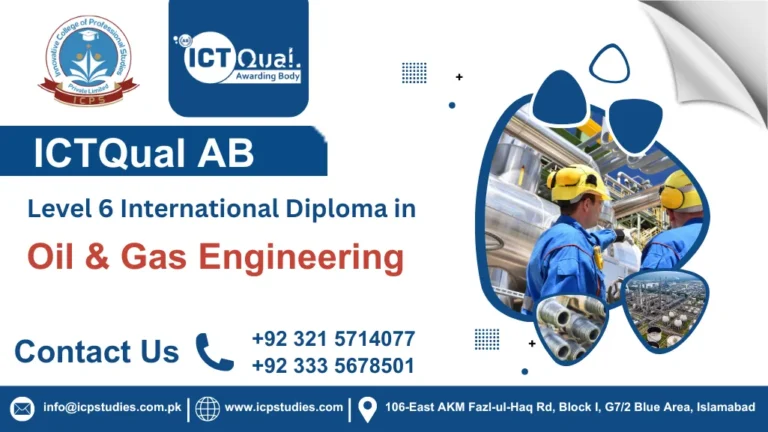The ICTQual Level 4 Diploma in Chemical Engineering is a high-quality, industry-recognized qualification, offering 120 credits upon successful completion. This intensive one-year program provides a solid foundation in key chemical engineering concepts, offering learners a combination of theoretical knowledge and practical skills. With a focus on real-world applications, this course is designed to prepare you for roles in the chemical engineering sector, helping you achieve professional success.
The Level 4 Diploma covers core topics essential for anyone entering the chemical engineering industry. It is structured to provide both theoretical understanding and practical insight into key areas such as process technology, chemical reaction engineering, thermodynamics, material science, and process control. The course is designed to ensure students develop the problem-solving skills, technical knowledge, and analytical capabilities needed in the fast-evolving field of chemical engineering.
The qualification consists of 120 credits, which are divided into mandatory and elective units. The course can be completed in one year, offering flexibility for those who wish to fast-track their education and career. Upon successful completion, students can progress to further study at a higher level or enter the workforce with the necessary skills to work in chemical engineering and related industries.
The ICTQual Level 4 Diploma in Chemical Engineering (120 Credits) is a well-rounded and industry-aligned qualification that provides students with the knowledge and skills needed to thrive in the dynamic field of chemical engineering. Whether you are starting your career, looking to advance your knowledge, or aiming for higher qualifications, this one-year course offers the perfect foundation for future success. Apply today to start your journey toward becoming a highly-skilled, qualified chemical engineer!
All About ICTQual Level 4 Diploma in Chemical engineering 120 Credits – one year
Course Overview
The ICTQual Level 4 Diploma in Chemical Engineering is a specialized, industry-recognized qualification designed to provide a comprehensive foundation in the core concepts of chemical engineering. Spanning one year and awarding 120 credits upon successful completion, this course equips students with both theoretical knowledge and practical skills required for a successful career in the chemical engineering sector.
Whether you are starting your career in chemical engineering or looking to deepen your expertise, this course offers essential insights into key areas such as process technology, thermodynamics, material science, and process control. The curriculum blends academic learning with real-world applications, ensuring that graduates are well-prepared for roles in industries ranging from manufacturing and pharmaceuticals to energy and environmental management.
Upon completing the course, students will have developed the critical thinking, problem-solving, and technical skills necessary to tackle complex challenges in chemical engineering. This qualification not only opens the door to exciting career opportunities but also provides a solid foundation for further academic advancement in the field.
Study Units
- Introduction to Chemical Engineering
- Process Heat Transfer
- Fundamentals of Chemistry for Engineers
- Fluid Mechanics for Chemical Engineers
- Mass Transfer Operations
- Chemical Reaction Engineering
- Materials and Process Selection
- Process Control and Instrumentation
- Environmental Engineering in Chemical Processes
- Chemical Engineering Thermodynamics
- Safety and Risk Management in Chemical Engineering
- Chemical Process Design Project
To enroll in the ICTQual Level 4 Diploma in Chemical Engineering, candidates must meet the following entry requirements:
- Educational Qualifications:
- Minimum of 5 GCSEs at Grade C/4 or above, including Mathematics, Science, and English, or equivalent qualifications.
- Level 3 qualification in a relevant field such as a Level 3 Diploma in Engineering, Science, or a related subject, or equivalent academic experience.
- Candidates with relevant industry experience in chemical or process engineering may also be considered, even if they do not hold formal academic qualifications.
- Basic Literacy and Numeracy:
- A solid understanding of basic mathematics and English, particularly in terms of technical vocabulary and problem-solving, is essential.
- Age Requirement:
- Applicants must be 17 years or older at the time of enrollment.
- English Language Proficiency:
- If English is not your first language, you may need to demonstrate proficiency through a recognized English language qualification (e.g., IELTS score of 5.5 or equivalent).
- Personal Motivation:
- Applicants should demonstrate a keen interest in chemical engineering, with the ability to engage in self-directed learning, problem-solving, and teamwork.
Please note that the final decision on entry is subject to the discretion of the course provider, and applicants may be asked to attend an interview or submit a personal statement outlining their academic background, work experience, and interest in pursuing this course.
The ICTQual Level 4 Diploma in Chemical Engineering is ideal for:
- Aspiring Chemical Engineers: Individuals who are eager to start a career in chemical engineering and gain a strong foundation in the essential principles of the field. This course provides the knowledge and practical skills required to enter the industry with confidence.
- Professionals Seeking Career Advancement: People who are already working in engineering or technical roles and want to specialize in chemical engineering. This diploma will enhance their expertise, making them eligible for higher-level positions in the industry.
- Graduates of Science or Engineering Programs: Individuals who have completed studies in related fields such as chemistry, physics, or general engineering and want to pursue a more specialized career in chemical engineering.
- Technical Professionals and Technicians: Those already working in chemical or process industries, such as technicians or operators, who wish to formalize and expand their knowledge in chemical engineering concepts and practices.
- Anyone with a Passion for Problem Solving in Engineering: If you have a strong interest in applying scientific principles to solve real-world challenges in chemical processes, this course will equip you with the necessary skills to succeed in the field.
The course is suitable for individuals who are looking to enter or advance within the chemical engineering sector, as well as those who wish to continue their studies at a higher level in the field.
Learning Outcomes
Here are the Learning Outcomes for each study unit in the ICTQual Level 4 Diploma in Chemical Engineering (120 Credits – One Year):
1. Introduction to Chemical Engineering (10 Credits)
- Learning Outcomes:
- Demonstrate an understanding of the fundamental principles and concepts in chemical engineering.
- Describe the historical development of chemical engineering and its application across various industries.
- Identify the core areas of chemical engineering such as process design, material handling, and system integration.
- Discuss the role of chemical engineers in industrial settings, addressing sustainability and ethical considerations in engineering practices.
2. Process Heat Transfer (10 Credits)
- Learning Outcomes:
- Explain the basic mechanisms of heat transfer, including conduction, convection, and radiation.
- Apply the principles of heat transfer to chemical process equipment such as heat exchangers and boilers.
- Calculate heat transfer rates and select appropriate materials for different thermal environments.
- Analyze energy balance in thermal processes and understand the impact of heat transfer on process efficiency.
3. Fundamentals of Chemistry for Engineers (10 Credits)
- Learning Outcomes:
- Apply basic principles of chemistry, including stoichiometry and thermodynamics, to chemical engineering problems.
- Demonstrate an understanding of atomic structure, bonding, and molecular interactions relevant to engineering materials.
- Explain how chemical reactions are driven by thermodynamic principles and kinetics.
- Solve problems involving chemical equations, reaction rates, and material balances.
4. Fluid Mechanics for Chemical Engineers (10 Credits)
- Learning Outcomes:
- Define key fluid properties and their significance in chemical processes.
- Analyze fluid flow using principles such as Bernoulli’s equation and the continuity equation.
- Design and calculate flow systems, including pumps and piping, for industrial applications.
- Evaluate the effects of viscosity, pressure, and temperature on fluid dynamics in different process environments.
5. Mass Transfer Operations (10 Credits)
- Learning Outcomes:
- Explain the principles of mass transfer, including diffusion, convective mass transfer, and mass transfer coefficients.
- Design separation processes such as distillation, filtration, and absorption based on mass transfer principles.
- Apply mathematical models to predict and optimize mass transfer in industrial processes.
- Analyze and select suitable separation technologies based on material properties and process conditions.
6. Chemical Reaction Engineering (10 Credits)
- Learning Outcomes:
- Understand the fundamental concepts of chemical reaction kinetics and rate laws.
- Analyze and design chemical reactors (batch, continuous) to optimize reaction performance.
- Apply the principles of catalysis and enzyme activity in industrial processes.
- Perform mass and energy balance calculations to size reactors and predict reactor behavior.
7. Materials and Process Selection (10 Credits)
- Learning Outcomes:
- Identify and compare different materials used in chemical engineering processes based on their physical and chemical properties.
- Select appropriate materials for process equipment design, considering factors such as corrosion, wear, and thermal stress.
- Apply principles of sustainability to process and material selection to reduce environmental impact.
- Evaluate the cost-effectiveness and performance of materials for specific applications.
8. Process Control and Instrumentation (10 Credits)
- Learning Outcomes:
- Describe the role of process control and instrumentation in chemical engineering.
- Understand control loop dynamics, including feedback, feedforward, and PID controllers.
- Interpret instrumentation diagrams and understand the principles behind sensors, actuators, and control systems.
- Apply process control principles to improve the efficiency and safety of chemical processes.
9. Environmental Engineering in Chemical Processes (10 Credits)
- Learning Outcomes:
- Explain the environmental impact of chemical processes and the role of chemical engineers in reducing pollution.
- Analyze the principles and technologies for wastewater treatment, air pollution control, and waste management.
- Implement strategies for sustainable resource management in chemical manufacturing.
- Interpret environmental regulations and guidelines that govern industrial operations.
10. Chemical Engineering Thermodynamics (10 Credits)
- Learning Outcomes:
- Apply the laws of thermodynamics to analyze energy systems in chemical processes.
- Understand phase equilibria and chemical equilibria in multi-component systems.
- Calculate thermodynamic properties of substances and apply these to industrial chemical reactions.
- Solve problems involving energy conservation, entropy, and enthalpy changes in chemical processes.
11. Safety and Risk Management in Chemical Engineering (10 Credits)
- Learning Outcomes:
- Identify and assess the risks associated with chemical engineering processes.
- Apply safety standards and regulations to minimize accidents and ensure safe operation in chemical plants.
- Perform risk analysis and hazard identification using tools like HAZOP and FMEA.
- Develop emergency response plans and understand the importance of safety audits and compliance.
12. Chemical Process Design Project (10 Credits)
- Learning Outcomes:
- Design a chemical process using principles of material and energy balances, thermodynamics, and reaction engineering.
- Develop process flow diagrams (PFDs) and piping and instrumentation diagrams (P&IDs).
- Evaluate the economic, environmental, and safety aspects of the proposed process design.
- Present and defend the design decisions and outcomes in a professional project report and presentation.
These learning outcomes ensure that students acquire both the theoretical knowledge and practical skills necessary to become successful chemical engineers. Each study unit builds upon the previous, allowing students to develop a well-rounded skill set in chemical engineering that will serve them in their future careers.
FAQs about ICTQual Level 4 Diploma in Chemical engineering 120 Credits – one year







